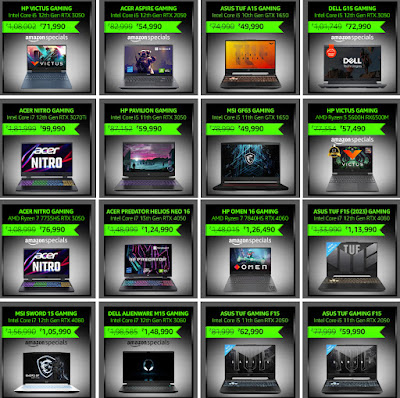Gaming Laptops : Gaming Accessories : Desktops : Digital Vlog Camera : Games : Tablets : Gamepad : Gaming TVs
Warranty : Exchange Offers
Bank Card Instant Discount On Credit/Debit Cards
Free Delivery : Schedule Delivery From Amazon
Product Information
Buy Gaming Laptops : Gaming Accessories : Desktops : Digital Vlog Camera : Games : Tablets : Gamepad : Gaming TVs From Amazon
LED Tv From Amazon
Best Selling Laptop From Amazon
Laptop Shop From Amazon
Amazon Online Shopping
Home & Kitchen Products From Amazon
Best Selling Immersion Heater
BedSheets From Amazon
Electronic From Amazon
Cricket Kits From Amazon
Best Selling Refrigerators From Amazon
Best Selling Induction CookTop From Amazon
Follow the Online Shopping Offers Channel on WhatsApp: https://whatsapp.com/channel/0029VaQxAx7F1YlZTX26ry1d
Please Share To Your Groups🤝
Disclosure : As An Amazon Associate I Earn From Qualifying Purchases.
=========================================================================
Buying a gaming laptop can be a significant investment, so it's important to choose wisely. Here are some key tips to guide your purchase:
1. Define Your Budget
- Gaming laptops range from budget-friendly options (
$800–$1,200) to high-end models ($2,000+).
- Determine how much you're willing to spend and prioritize features within that range.
2. Prioritize the GPU (Graphics Card)
- The GPU is the most important component for gaming performance.
- Entry-Level Gaming: NVIDIA GTX 1650/1660 or RTX 3050/3050 Ti.
- Mid-Range Gaming: NVIDIA RTX 3060/3070 or AMD Radeon RX 6600/6700M.
- High-End Gaming: NVIDIA RTX 4070/4080/4090 or AMD Radeon RX 7000 series.
3. Choose an Appropriate CPU
- A powerful CPU is necessary but secondary to the GPU for gaming.
- Intel: Look for Intel Core i5/i7/i9 (12th or 13th Gen).
- AMD: Look for Ryzen 5/7/9 6000/7000 series.
- Avoid older generations unless on a tight budget.
4. Consider RAM and Storage
- RAM: Minimum 16GB for smooth performance; 32GB for future-proofing.
- Storage: At least 512GB SSD. Look for laptops with expandable storage or additional HDD space if needed.
5. Screen Quality and Refresh Rate
- Resolution: 1080p (FHD) is standard; 1440p (QHD) or 4K for better visuals but higher costs.
- Refresh Rate: Minimum 120Hz for smooth gameplay; 144Hz or higher is ideal for competitive gaming.
- Size: 15.6-inch is portable, while 17-inch offers more immersion.
6. Evaluate Build Quality and Portability
- Consider durability, keyboard quality, and weight.
- Laptops with better cooling solutions tend to be bulkier but handle high-performance gaming more effectively.
7. Battery Life
- Gaming laptops typically have poor battery life (~2–5 hours during gaming). If portability is key, look for options with better efficiency.
8. Connectivity Options
- Ensure the laptop has sufficient ports:
- USB-A, USB-C, HDMI, Ethernet, and audio jack.
- Wi-Fi 6 or Wi-Fi 6E for better wireless performance.
- Thunderbolt support for advanced connectivity (if needed).
9. Brand and Warranty
- Reliable brands: ASUS ROG, MSI, Alienware, Acer Predator, Lenovo Legion, HP Omen.
- Check for a solid warranty and good customer support in your region.
10. Future-Proofing
- Look for features like upgradable RAM/storage and support for the latest standards (e.g., PCIe 4.0, DDR5 RAM).












No comments:
Post a Comment